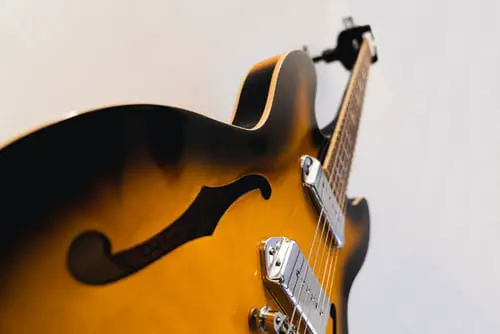In this article we will be looking at the guitar pickup.
- What is a guitar pickup?
- When to replace your guitar pickups?
- The process of changing your guitar pickup
1. What is a guitar pickup?
A guitar pickup is considered to be a magnet and can be made from alnico or ferrite, surrounded by copper wires. When the magnetic field of the magnet is affected, small voltages will be generated inside the wires. Since a guitar usually will consist of 6 strings, the majority of guitar pickups also have 6 pole pieces. And its mechanism is to work on the vibrations of your strings to transform them into electrical signals. These signals are eventually sent to the guitar’s amplifier boosting them to sound cleaner, crisper, and as powerful as possible. Some of the feedback noise will be excluded and the guitar pickup will amplify the natural sound. Moreover, the guitar pickup adds more colors to your sound and the signal, offering opportunities for the instrument players to express their music personalities and feel free to try any music taste. The guitar pickups are especially favored by electric guitar and electric bass players.
Depending on the type of music and guitars that you play, you can choose among a variety of different models on the market. For example, there are electric guitar pickups, electric bass guitar pickups and acoustic pickups.
Electric Guitar Pickups
Single Coil:
Single coil means a single magnet. This type of guitar pickup is widely used for the Fender Stratocaster, etc. Single coil pickups will bring a sense of brighter, twangier, crisper tone than other types, also glassy and chiming, and are pretty famous for those who are into the country, surf genres. But this type of pickup is not that suitable for high level engaging of distortion. Let’s get back to the mechanism of the whole guitar pickup operating concept, with our magnet being surrounded by a coil of wire. If we have only one coil of wire, the strength of the field will have quite low energy, leading to a lower output level and also reduce low-frequency response.
Humbucker:
Humbucker combines two single-coil pickups together in transforming your sound, eliminating the annoying electrical hums and other extraneous noise, and improving the quality in general. Its vibe involves a more warm and higher tone compared to the single-coil pickup. And for that reason, many consider using it for the jazz genre. One advantage that the humbucker has over the single-coil pickup is that it can get along pretty well with the genres where high levels of distortions are required since they can push amps harder, matching perfectly with the metal and hard rock. One more interesting feature about this type of guitar pickup is that since it has an additional second row of coils, the humbucker can work on wider parts of the string, generating a heavier, stronger tone.
Bass Guitar Pickups
Split-coil:
We’ve already seen that the humbucker consists of two single coils, producing a thicker, smoother but also warmer sound. While with a single-coil pickup, the sound tends to be richer, placing it at more prominent positions on the frequency spectrum. But have you ever imagined what if there’s a way to have two opposite music vibes in one? Two pickup styles in one? Considering this option: Coil-splitting with turning off one of the coils in a humbucker.
Dual-coil:
We mention the split-coil above and now a dual-coil, what’s the main difference? It lies in the number of coils of wire wrapped around the magnets. Dual coil pickups will have two coils of wire wrapped around magnets. Other features that separate the dual-coil from one-coil can be listed as generating more outputs, sensing the string in two locations for a wider aperture, increasing tonal options,…
Soap bar:
For those searching for little favors of rock with high energy, even early punk rock, the Soap Bar might be what you need.
Acoustics Pickups
Transducer Pickups:
For the guitarists who are into the acoustics style, the transducer pickup is what they’ve always searched for. By tracking the response of your soundboard reacting to the vibrations of guitar strings, it will adhere to the guitar’s soundboard and then transform the signal into an electric one.
Piezo Pickups:
If the transducer pickup lies under the soundboard, this piezo pickup will be under the saddle and is built into the bridge of your guitar, bringing a more synthetic sound compared to the transducer. This type of pickup will also fit into the cases where you want to try performing at bigger venues or experiencing larger amounts of volume.
Soundhole Pickups:
About the name “soundhole”, basically this type of guitar pickup will have a design that fits perfectly in the soundhole of your acoustic guitar. The sound generated is warm, feedback resistant, and also bringing a lifelike tone.
2. When to replace your guitar pickups?
How do you know whether you need a new guitar pickup? Or is there any thing wrong with it that keeps affecting the quality of your sound and tone? To be honest, generally speaking, there won’t be a perfectly correct answer that’s gonna satisfy this question. Guitarists may decide to change their pickups because they are in the mood for trying different vibes of music maybe, or because they start to get bored with the old styles,… In another case, when your guitar sounds a little bit dark and even muddy, changing another guitar pickup may be a good suggestion.
Another situation that should be mentioned as the reason for changing guitar pickup: You love everything about your guitar, but you hate the tone and sound. For example, if you want the sound to be a whole lot cleaner, change your guitar pickup to one that will help improve the level of clarity in the high end. Or if you are excited to experience that chugga chugga vibes but your tone is, on the other hand, too bright and warm, then look for a guitar pickup with more bass effects. Every single guitar has its own story connected to the owner, the guitarists. You can’t just get rid of it immediately the second you question its tone and sound outcomes, there is another solution and that is changing the pickups , allowing you to hang on to your memories.
Also, are you curious about what the active guitar pickup is going to be like compared to the passive guitar pickup, which is used widely for a lot of guitar models? With the active guitar pickup, you will be able to boost or cut treble and bass, replicating the same process on a mixer. Also the passive pickups are generally generating weaker sounds compared to the active ones, in this case, the amplifier will play a more important role, however, this type of guitar pickup comes with a lower price.
3. The process of changing your guitar pickup
This time, when changing a new guitar pickup, you should go through all of the main reasons that convince you to do it, clearly, the music styles, types of tone, and last but not least, seeking recommendations from reviews and feedback of others.
Step 1
First of all, before removing your previous guitar pickup, you should take a photo to keep a record of the height that you are using for the pickup since it plays such an important role in generating the tone and sound of your guitar. What if after a while switching into a new guitar pickup, you want to change back to the old pickup?
Step 2
The next step, unscrewing or also known as removing the black plate to get access to the wires. You should select the correctly fitting screwdriver to remove the screws. Remember to put it somewhere else and keep it in a safe place for later. Then gently take the plate out of the position to see all the messy and complicated wires, but don’t stress out, those next steps won’t be that challenging if you follow the techniques strictly.
Again, you need to keep a record of the positions of all wires carefully, taking pictures of it. Checking the cavity and if possible, don’t just take some photos, take out a paper, and note down all the orders and detailed positions.
Step 3
The next step in the process is going to be a tough one and you need to pay attention and also be patient: Desoldering the pickup wiring. Identify the points that connect all the pickup wires. Desoldering each wire, one by one, starting with placing the tip of this tool directly at the connecting point and pulling the wire off.
Don’t forget to detune your strings and remove them as well. You can use tools like Roadie 2 to unwind the strings or even by hand.
Step 4
After removing the strings, the wires, now, it’s time to continue and remove the mounting screws that keep the old pickups staying in the soundhole on your guitar. Then, mounting the new pickups in their place and adjusting the pickup’s wire through the hole towards the back cavity. Plugging in the new screws at correct positions to replace the old ones and hole the new pickup.
Step 5
Now take a look at your previous diagram illustrating the wire’s positions and its connection towards each other, soldering the new pickup wires to its correct places. You need to be aware that poor connections of the wires can cause the quality of your sound to seem off and lead to tone issues. Small tips that will help you during the soldering process: Try to remove the volume pots if you can’t reach their lugs. Doing this will avoid unfortunate events like melting the other wires on your soldering iron. And you can also consider using a stand for the soldering iron, carefully or else you might accidentally leave an ugly mark on your guitar.
Finally, testing your new wires and guitar pickup by playing, of course. But always remember to test it before replacing the strings and closing the cavity.

